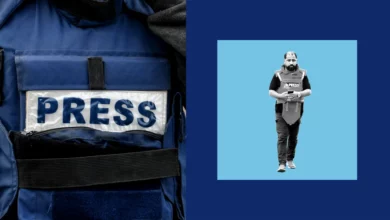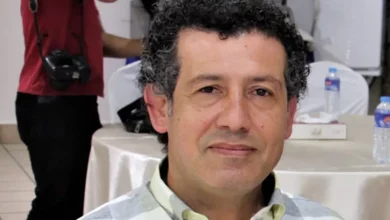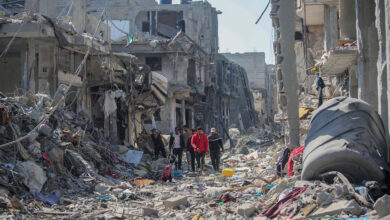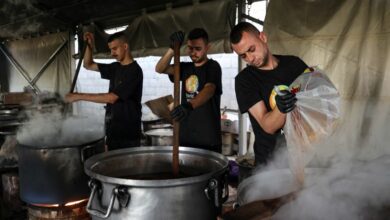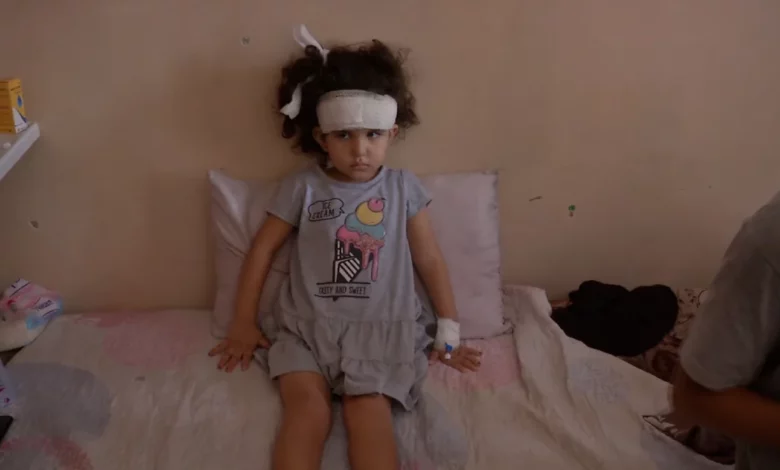
Three-year-old Joudi hasn’t uttered a word in 16 days, her father says. Wearing a gray dress adorned with a picture of an ice cream cone, she stares ahead, a vacant look in her eyes, while sitting in bed at al-Shifa Hospital in Gaza City.
Her forehead is wrapped in bandages, a piece of shrapnel still lodged in her head.
She was injured when her family was fleeing their home in Al Karama Towers in northern Gaza City. They were trying to get to the Sheikh Radwan neighborhood, believing they would be safer there, when an airstrike hit a car next to theirs.
Gaza, the Palestinian enclave of more than 2 million people, has been under bombardment by the Israel Defense Forces (IDF) for more than three weeks, following the gruesome October 7 terrorist attacks in Israel by Hamas, the militant group that governs the territory.
More than 1,400 Israelis and foreigners, including dozens of children, were killed in that attack, with over 220 others taken hostage, according to Israeli authorities.
The civilian death toll from the ensuing Israeli airstrikes, which the IDF says are targeting Hamas, has been enormous.
Nearly 8,000 Palestinians, including around 3,300 children, have been killed so far, according to the Hamas-controlled Ministry of Health in Ramallah, which compiles figures from Gaza.
Save the Children, working off those numbers, says more children have been killed in the last three weeks in Gaza than during armed conflict worldwide each year since 2019.
More than 20,000 people are injured, according to the Palestinian Ministry of Health in Ramallah.
The IDF has told civilians to leave northern Gaza, where much of the strikes are focused, and flee south. But not everyone is in a position to leave and the journey is dangerous, especially with Israeli bombardment in parts of the south as well as the north.
Moving south
Hala Bin Naeem is from Beit Hanoun, a city in the northeastern corner of Gaza.
The 13-year-old said her family fled their home on October 7, sheltering at the Deir al-Balah refugee camp, then Khan Younis and Rafah. The three places are within the area the IDF told people to move to – south of Wadi Gaza, the waterway that bisects the Gaza Strip.
IDF spokesperson Rear Adm. Daniel Hagari reiterated that call on Sunday, telling civilians to “increase the urgency” to “temporarily move south of Wadi Gaza to a safer area.”
Despite following that guidance, Hala’s family didn’t escape Israeli airstrikes.
Hala told CNN her sisters-in-law were killed in an airstrike on October 11. Her niece and sister were also injured in the attack. It is unclear where the strike happened.
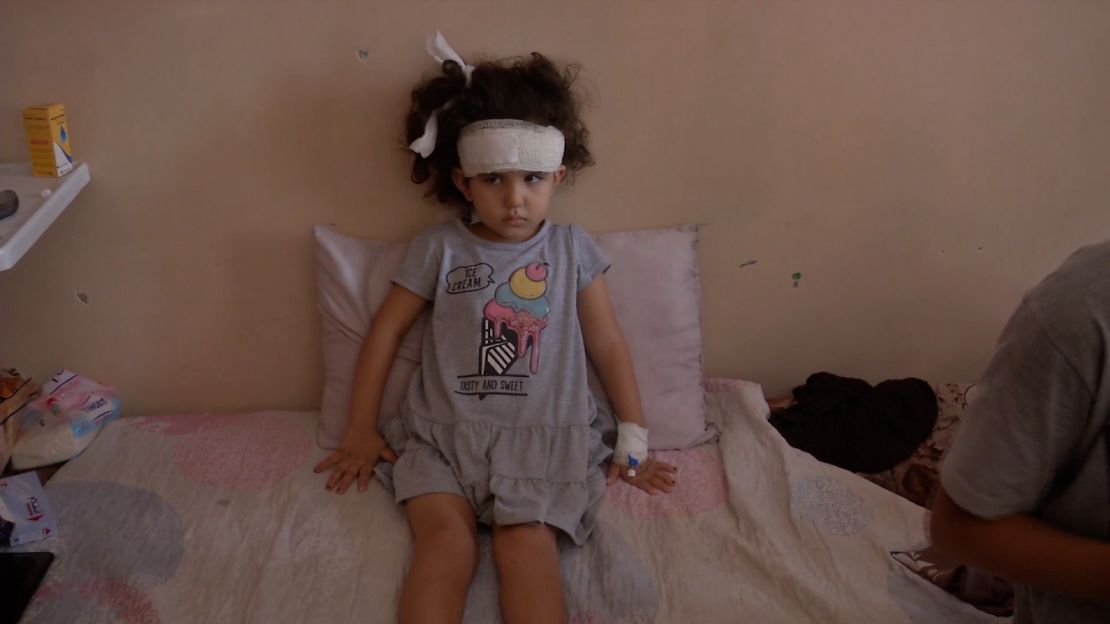
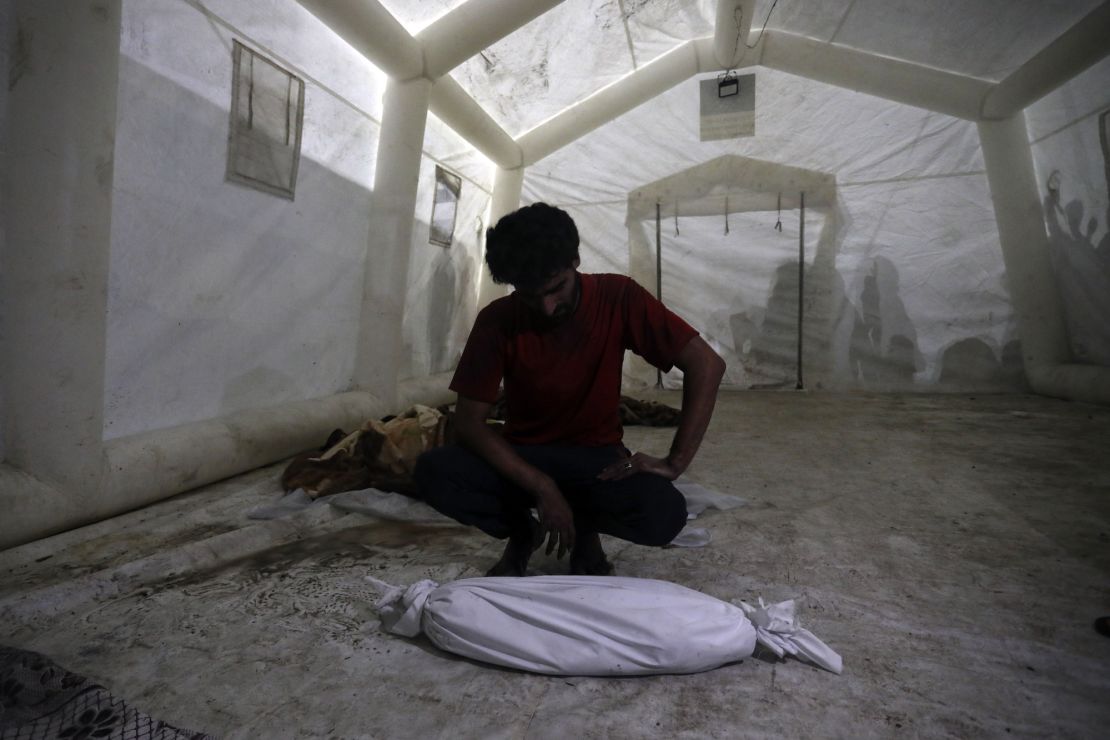
Eyewitnesses told CNN that Deir al-Balah was struck on Friday evening, alongside other locations in central Gaza.
“We were living in peace, suddenly we heard banging and noises. We were safe and suddenly everything changed and came crashing,” Hala told CNN at the Deir al-Balah refugee camp.
“We also went to the schools and the situation has become dangerous and it becomes more dangerous day in, day out. We are really very frightened … so I hope the war ends and we live normal life and we win victory,” she said.
The situation at the camp is dire, Hala added.
“We struggle to sort out a small amount of water for the little children to drink … we wait for five to seven hours at the bakery to buy some bread to eat. The situation becomes worse daily,” she said.
Civil order ‘starting to break down’
On Sunday, UNRWA, the United Nations relief agency that works with Palestinian refugees, said “thousands” of desperate people breached its warehouses and took basic items, including wheat, flour and hygiene products.
A warehouse in Deir al-Balah, the refugee camp where Hala is sheltering, was one of those breached, UNRWA said.
“This is a worrying sign that civil order is starting to break down after three weeks of war and a tight siege on Gaza. People are scared, frustrated and desperate,” said Thomas White, director of UNRWA Affairs in Gaza.
He said that aid currently allowed into Gaza does not cover the basic needs of the communities that are fighting for survival.
The Palestinian Red Crescent said on Sunday that only 118 trucks loaded with supplies have reached Gaza since some aid was allowed through the Rafah border crossing with Egypt last week – the only way into the enclave at the moment.
Another 59 trucks arrived at the border on Monday morning.
But that amount is a drop in the ocean, aid groups say.
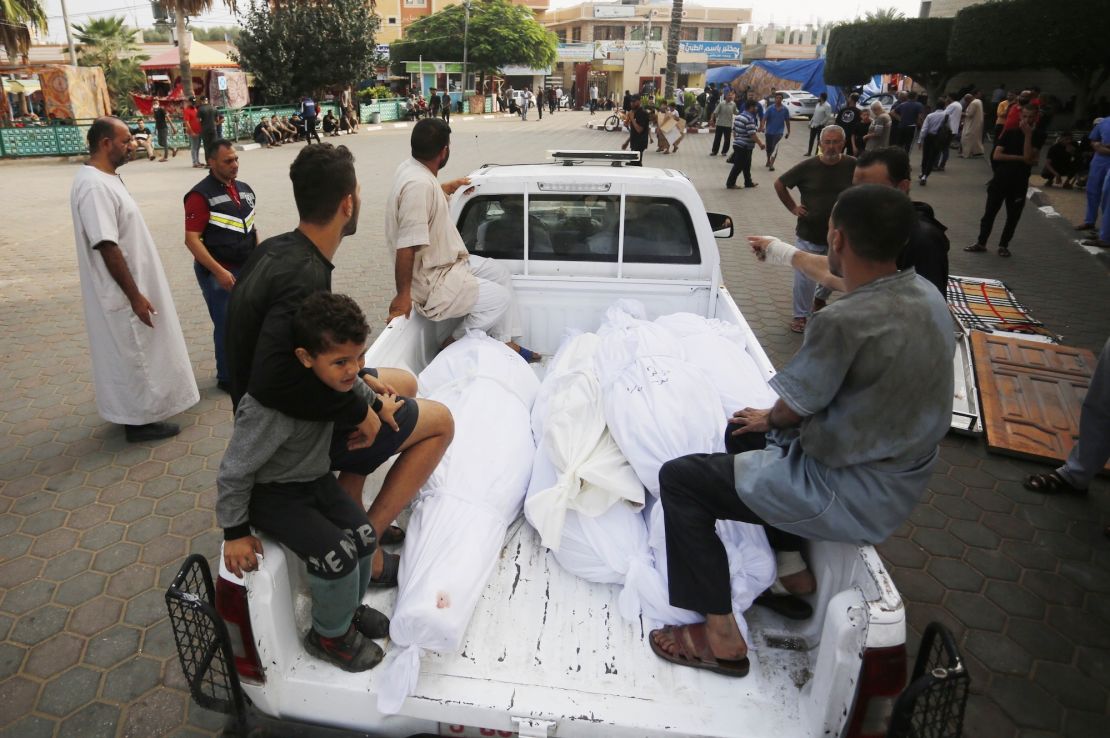
The UN said 455 trucks used to come to Gaza each day before the war. The IDF said Sunday that it expects more aid trucks to begin entering Gaza soon, and denied that there were shortages of food, water or medicine, despite the complete closure Israel imposed on the territory in response to the October 7 Hamas attack on Israel.
“We have established a joint mechanism with the U.N., the U.S. and Egypt to facilitate the access of humanitarian assistance from Egypt to Gaza,” Elad Goren, Head of Civil Affairs Department for COGAT (Coordinator of Government Activities in the Territories), said in a briefing, adding: “We have a lot of concerns about what is on those trucks so we are inspecting…We will see more trucks and the amount will be much higher in the next few days.”
The already grim humanitarian situation was made worse by a near-total communication blackout that started on Friday and lasted into Sunday morning
Ibrahim Dahman, CNN’s producer in Gaza, said people were struggling to reach their loved ones in the enclave.
“I cannot reach them and I don’t know anything about them,” Dahman said in one of several short voice recordings sent to CNN colleagues on Saturday. He was using a phone with a foreign SIM card, which allowed him intermittent connection via WhatsApp.
“Even if they were subjected to shelling, or to be killed or wounded, I wouldn’t know anything,” he said.
Dahman said on Monday that his parents were safe.
Hospital urged to evacuate
Meanwhile, people being treated at al-Shifa Hospital in Gaza City, including 3-year old Joudi, have found themselves facing more risk.
The IDF on Friday accused the hospital of being the site of a major Hamas command and control center. The IDF said Hamas was directing rocket attacks and commanding operations from bunkers underneath the hospital building – a claim Hamas has denied.
“When medical facilities are used for terror purposes, they are liable to lose their protection from attack in accordance with international law,” Hagari said in a briefing, appearing to suggest al-Shifa Hospital was on Israel’s target list.
Dr. Medhat Abbas, director general of the health ministry in Gaza, told CNN that its hospitals “are used to treat patients only” and are not being used “to hide anyone.”
For now, Joudi and hundreds of other injured children are staying put in the hospital.
Doctors are trying their best to save as many people as possible, but the conditions are getting more difficult by the hour. The hospital, designed for 700 patients, has been treating 5,000 people every day, according to local health authorities.
Patients are lying on the floors and in the corridors as more casualties flood the hospital, officials say and videos from the hospital show. Fuel shortages and the communications blackout are making the situation even worse.
Joudi’s family has a short video of her, filmed not too long ago. It shows her wearing a pink, princess-like dress and a sparkling tiara. She looks shy at first, then puts on a broad smile for whoever is behind the camera.
That smile is now just a memory, her tiara replaced by bandages. Still in shock, Joudi is refusing to eat or drink, her father told CNN. She barely moves, sitting still and looking into the distance. Doctors told the family Joudi is paralized. They couldn’t take the shrapnel out of her skull.
Hassan Eslayeh and Mohammad Al Sawalhi reported from Gaza. Ivana Kottasová reported and wrote from Ashkelon, Israel. Kareem Khadder and Abeer Salman reported from Jerusalem and Sarah Diab reported from London. CNN’s Andrew Carey, Radina Gigova, Amir Tal, Zeena Saifi, Chris Liakos, Richard Allen Greene, Manveena Suri, Eyad Kourdi and Magdy Abbas contributed to this report.

